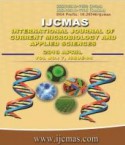


 National Academy of Agricultural Sciences (NAAS)
National Academy of Agricultural Sciences (NAAS)

|
PRINT ISSN : 2319-7692
Online ISSN : 2319-7706 Issues : 12 per year Publisher : Excellent Publishers Email : editorijcmas@gmail.com / submit@ijcmas.com Editor-in-chief: Dr.M.Prakash Index Copernicus ICV 2018: 95.39 NAAS RATING 2020: 5.38 |
Livestock sector play a major economic and cultural influence throughout the world. The changing scenario of climate is a threat for sustainability of this sector. Climatic events such as rising temperatures are detrimental to the productive capacity of livestock under tropical climatic conditions. Heat stress due to rise in temperature affect the high producing animals more than low producing animals due to more metabolic heat productions. Countries which are under tropical and sub-tropical region are more sufferer of climate change. The energy metabolism and heat production of animals is highly variable, depending on the activity of the animal, its diet, thermoregulatory functions, sex, reproductive condition, time of day and year hair or feather characteristics, weather, parasites and pathogens, and various social and psychological effects. However, Knowledge and understanding of characteristics that directly used as a marker of heat stress includes coat, hide, skin, enzymes, hormones and hematological attributes may be helpful in combating the effect of harsh environment.
 |
 |
 |
 |
 |